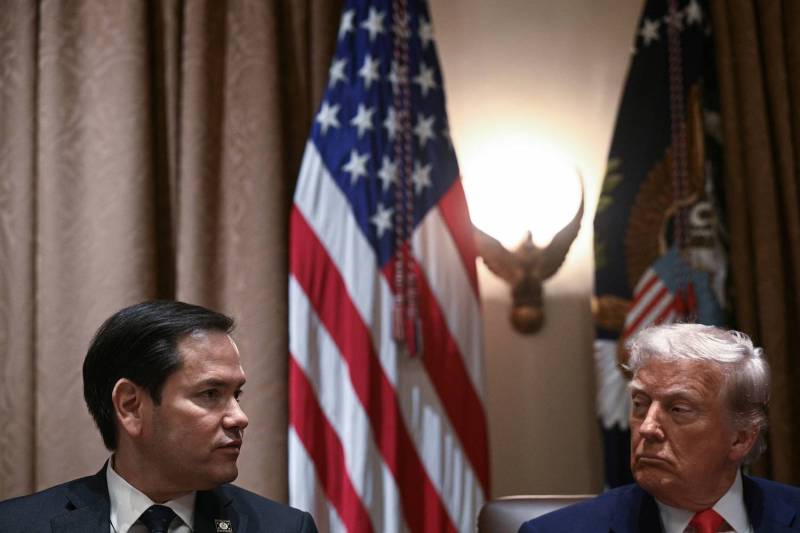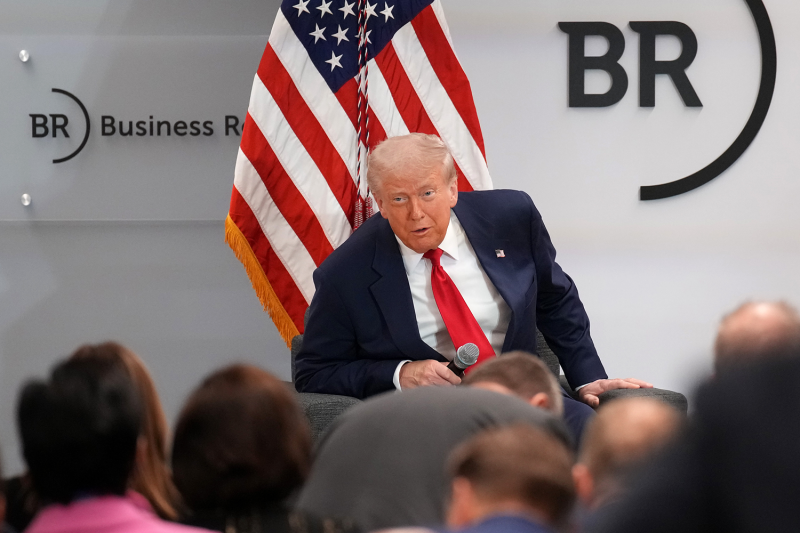Rubio’s Reorganization Plan Is a Wrecking Ball

Rubio’s Reorganization Plan Is a Wrecking Ball
The State Department revamp goes far beyond streamlining—it will devalue human rights and strip away critical expertise.
U.S. President Donald Trump listens to Secretary of State Marco Rubio at a cabinet meeting in the White House in Washington, D.C., on April 10. Brendan Smialowski/AFP via Getty Images
Last week, U.S. Secretary of State Marco Rubio released his proposal to reorganize the Department of State—and it’s a doozy. When I joined government as the U.S. special envoy for the human rights of LGBTQI+ persons, after a career working for human rights organizations, I found many of the clichés about government inefficiency to be true. However, Rubio’s plan— which includes reducing U.S.-based staff by 15 percent, cutting 132 offices, and transitioning an additional 137 offices into other parts of the department—is the equivalent of wielding a chainsaw when the patient deserves a scalpel.
Many will shrug, assuming that news as seemingly mundane as a new organizational chart for a federal agency doesn’t impact them or that cuts to government agencies are by definition beneficial. But the truth is that the proposed restructuring of the State Department, including the elimination and downsizing of various bureaus that promote justice globally, will have profoundly negative consequences for American interests and the well-being of people around the world.
Last week, U.S. Secretary of State Marco Rubio released his proposal to reorganize the Department of State—and it’s a doozy. When I joined government as the U.S. special envoy for the human rights of LGBTQI+ persons, after a career working for human rights organizations, I found many of the clichés about government inefficiency to be true. However, Rubio’s plan— which includes reducing U.S.-based staff by 15 percent, cutting 132 offices, and transitioning an additional 137 offices into other parts of the department—is the equivalent of wielding a chainsaw when the patient deserves a scalpel.
Many will shrug, assuming that news as seemingly mundane as a new organizational chart for a federal agency doesn’t impact them or that cuts to government agencies are by definition beneficial. But the truth is that the proposed restructuring of the State Department, including the elimination and downsizing of various bureaus that promote justice globally, will have profoundly negative consequences for American interests and the well-being of people around the world.
The new plan doesn’t just devalue human rights—a critical feature of U.S. foreign policy—it also strips the State Department of expertise around key foreign-policy issues like countering disinformation, fighting corruption, and defending democracy worldwide. Moreover, it imposes an extremist worldview that brands support for marginalized populations as anti-American, undermining core national interests like a strong economy, reliable allies, and global capacity to fight disease.
While the State Department is not a human rights organization, the extent to which it is willing to respect human rights tilts the scales of justice globally. Thus, the omissions from the State Department’s new structure are telling, demonstrating a failure to understand how events around the world directly impact Americans. Nor does the plan reflect long-standing bipartisan foreign-policy priorities or issues with strong support within the American public.
For example, the proposed reorganization makes no mention of the Office of Global Criminal Justice, which pursues accountability for war crimes like sexual slavery, the abduction of children as child soldiers, and the use of chemical weapons against civilians. Similarly, according to the proposed plan, the Office of Global Women’s Issues (GWI), which works to end child and forced marriage among other forms of oppression against women and girls, will apparently be eliminated. As crises in Afghanistan, Sudan, and beyond show, women and girls are disproportionately targeted for violence. Yet ample evidence demonstrates that empowering women and girls boosts economic growth, fosters social resilience, and promotes peace and stability. This is exactly why mechanisms like GWI are essential; GWI’s targeted programming for women and girls ensures that U.S. investments produce a high rate of return for those most affected.
The proposed reorganization also includes the apparent elimination of the Foreign Service Institute, which has trained new foreign service officers since 1947, thus threatening to send the next generation of U.S. foreign service officers into crises worldwide without adequate training or support.
While the elimination of entire programs is alarming, so is the diluting of robust and effective mechanisms. The Bureau of Democracy, Human Rights, and Labor (DRL), which has been the centerpiece of U.S. human rights policy since the 1970s and supports the promotion of democratic values and labor rights globally, has been moved under the office on foreign assistance. While this reshuffling will still allow DRL to offer grants, the bureau is likely to not have a say in the department’s policy positions since its new location doesn’t have a policy function. In a previous iteration of the new chart that circulated widely and was seen by Foreign Policy, DRL was renamed as the Bureau of Democracy, Human Rights, and Religious Freedom, falsely suggesting that religious freedoms do not fall within human rights and that, in a hierarchy of priorities, workers have no value.
This is not an effort to prevent government inefficiency, as Rubio claims. If the plan takes shape, critical subject-matter expertise will be eliminated. Entire programs will be cut. Partnerships with allies will be severed. The State Department will be under-resourced exactly at the time it is called upon to absorb programs by the largely defunct U.S. Agency for International Development (USAID) and hollowed out exactly at the time diplomacy is most needed.
With wars raging on three continents, the proposed reorganization and alleged cuts to staffing will leave the State Department and Rubio with less bandwidth to tackle the complexities of today’s global politics, human rights crises, and conflicts. If these changes are implemented as proposed, it will send a clear message of indifference to repressive governments if they block free and fair elections, engage in cronyism and other forms of corruption, ban free speech, target nongovernmental organizations, oppress minorities, commit war crimes, or arbitrarily arrest their own citizens.
The proposed changes at the State Department come against the backdrop of other major cuts to U.S. foreign-policy mechanisms. The dismantling of the U.S. Agency for Global Media, which includes Voice of America and Radio Free Europe/Radio Liberty, has eliminated tools to provide reliable news for people who too often are denied access to the free press—and by extension, it also hurt U.S. soft power. The stripping down of USAID has led to the abrupt termination of lifesaving programs, including HIV/AIDS clinics and famine relief programs. Meanwhile, the Trump administration’s federal job cuts have adversely impacted key foreign-policy sectors like global health and rights. Amid all this slashing, the reputational damage for the United States has been almost unimaginably vast.
Americans are right to expect change from our government, but if they’re concerned about the price of increasingly unaffordable eggs and home mortgages, they need to understand that domestic and foreign policy are interdependent. To meaningfully protect human rights at home, we absolutely need to invest in human rights globally. For example, to increase American prosperity, we must fight forced labor around the world or else goods made by American workers will be too costly to compete in the global market as compared to goods manufactured by forced or child labor. If we want favorable trade with other countries, we need to monitor and implement existing trade agreements that protect American workers, farmers, businesses, and consumers’ economic interests. If we don’t want another pandemic, we need to fund the United Nations, including lifesaving agencies like the World Health Organization. If we want to protect Americans at home and abroad, we need to invest in security and the rule of law across the globe.
This isn’t to say that the State Department doesn’t need to be streamlined; redundancies should always be eliminated, and decisions need to be made quickly, but the Trump administration’s proposals cut well past the bone.
We can imagine alternate ways to restructure the department to maximize efficiency, such as by shortening the clearance process and clarifying who has decision-making authority to avoid intradepartmental turf wars. However, if we want to envision a State Department that truly prioritizes consultations with local communities, especially those that are most marginalized, it would require increasing investment in mechanisms with strong track records DRL or GWI. If we are proud of our national values, we should uplift the United States’ historic struggles for civil rights and justice by adequately resourcing special envoys, special representatives, and special advisors for human rights instead of eliminating them. The U.S. Congress can play a vital role in the solution by legislating for human rights. It can include more statutory requirements for human rights in the annual human rights reports; ensure that the State Department budget reauthorization increases; and mandate funding for foreign assistance.
Rubio said the announced reorganization of the State Department is just a proposal. Let’s hold him to that. It is sorely lacking a commitment to expertise, to public servants, and to the fundamental principles that guide U.S. foreign policy. The American people—and people everywhere—deserve better.
Jessica Stern is the former U.S. special envoy for the human rights of LGBTQI+ persons (2021 to 2025) and the former executive director of Outright International (2012 to 2021). She is now a co-founder and principal of the Alliance for Diplomacy and Justice, a new initiative consisting of eight former ambassadors, special representatives, and special envoys advocating for human rights, development, and global justice.
More from Foreign Policy
-

A drawn illustration of a Trump whirlwind on a red background Four Explanatory Models for Trump’s Chaos
It’s clear that the second Trump administration is aiming for change—not inertia—in U.S. foreign policy.
-

Marco Rubio is seen up close, sitting on a couch beside J.D. Vance. Marco Rubio’s Soulless Crusade
The U.S. secretary of state stands for no principle other than serving the man who appointed him.
-

Soldiers from various NATO allies take part in a military exercise at the Smardan Training Area in Smardan, Romania, on Feb. 19. America Will Miss Europe’s Dependence When It’s Gone
European self-reliance for security will cost U.S. jobs, profits, and influence.
-

A collage photo illustration shows Donald Trump gesturing with arms wide. In front of him are headshots of Benjamin Netanyahu and Vlodymyr Zelensky, images of immigratns and ICE police, a tattered EU flag and America First signs. Trump’s First 100 Days on the Global Stage
Ten thinkers on what to make of the opening salvo of the president’s second term.








Join the Conversation
Commenting on this and other recent articles is just one benefit of a Foreign Policy subscription.
Already a subscriber?
.
Subscribe
Subscribe
View Comments
Join the Conversation
Join the conversation on this and other recent Foreign Policy articles when you subscribe now.
Subscribe
Subscribe
Not your account?
View Comments
Join the Conversation
Please follow our comment guidelines, stay on topic, and be civil, courteous, and respectful of others’ beliefs.
Change your username |
Log out
Change your username:
CANCEL
Confirm your username to get started.
The default username below has been generated using the first name and last initial on your FP subscriber account. Usernames may be updated at any time and must not contain inappropriate or offensive language.